




Having a dishwasher can be a real time-saver, making the chore of washing dishes by hand a thing of the past. But how long can we expect our dishwashers to last? Are they built to withstand the test of time, or will we find ourselves replacing them after just a few years?
The lifespan of a dishwasher depends on several factors, including the brand, the frequency of use, and how well it is maintained. On average, a dishwasher can last anywhere from 10 to 15 years. However, with proper care and regular maintenance, you can extend its lifespan even further.
When it comes to maintenance, there are a few key areas to focus on. First, you’ll want to regularly clean the filters to remove any buildup of food and mineral deposits. This is especially important if you live in an area with hard water. Additionally, it’s a good practice to run a hot water test cycle every now and then to keep the dishwasher in top shape.
But what about the noise? Many homeowners may find the noise produced by their dishwasher to be a bit bothersome. If you’re finding it hard to have a conversation or watch TV while your dishwasher is running, there are some steps you can take to reduce the noise. One option is to check the setting on your dishwasher and make sure it’s on a quieter mode. You can also try placing some noise-absorbing material around the dishwasher to help dampen the sound.
Ultimately, the lifespan of your dishwasher will depend on how well you take care of it. Regular maintenance, including cleaning filters and running hot water tests, will help to ensure that your dishwasher lasts as long as possible. And if you do find yourself in need of a new dishwasher, be sure to research the market and compare different brands. While a dishwasher can be a costly investment, it pays to do your homework and choose a model that will suit your needs and last for many years to come.
Solved: How Long Do Dishwashers Last?
When it comes to household appliances, dishwashers are one of the most essential machines to have in the kitchen. They take away the chore of washing dishes by hand and save you time and effort. But how long do dishwashers actually last?
Factors Affecting the Lifespan of Dishwashers
There are a number of factors that can determine how long your dishwasher will last. One factor to remember is the quality of the dishwasher itself. High-quality brands tend to last longer than cheaper options. Regular maintenance and proper usage also play a significant role in extending the lifespan of your dishwasher.
For example, if you regularly clean the dishwasher’s filter, scrape off excess food from dishes before loading them, and follow the manufacturer’s instructions on loading and setting, you’ll likely have a dishwasher that lasts longer. On the other hand, neglecting maintenance and not following best practices can lead to problems and a shorter lifespan.
Another factor to consider is the type of dishwasher you have. Front-loaders, for instance, tend to have a longer lifespan compared to top-loaders. Proper ventilation is also crucial in keeping your dishwasher running smoothly. An old dishwasher with poor ventilation may overheat and require more repairs to keep it working.
The Average Lifespan of a Dishwasher
The average lifespan of a dishwasher is typically around 10 to 12 years, but some machines can last even longer with proper care. However, it’s important to keep in mind that this lifespan can vary depending on the factors mentioned above.
If you’ve had your dishwasher for a long time and it’s starting to show signs of wear and tear or if it’s frequently requiring repairs, it may be time to consider replacing it. Paying attention to these signs will help you avoid the hassle and frustration of a dishwasher breaking down when you need it most.
Tips for Maintaining Your Dishwasher
To keep your dishwasher in the best condition possible and help extend its lifespan, here are some helpful tips:
- Regularly clean the dishwasher filter to prevent clogs and ensure proper drainage.
- Scrape off excess food from dishes before loading them into the dishwasher.
- Follow the manufacturer’s instructions for loading and setting the dishwasher.
- Check the hoses for any signs of damage and replace them if needed.
- Maintain proper ventilation around the dishwasher to prevent overheating.
By following these tips and taking good care of your dishwasher, you can expect it to last for many years without any major issues. And if you ever run into problems, having a warranty handy can be helpful in getting it repaired or replaced.
In conclusion, the average lifespan of a dishwasher is around 10 to 12 years, but this can vary depending on factors such as the quality of the dishwasher, maintenance, and usage. By paying attention to these factors and following proper maintenance practices, you can ensure that your dishwasher lasts as long as possible.
Discover the Average Lifespan of Dishwashers
When it comes to household appliances, the dishwasher is often considered a true lifesaver. No one enjoys spending their precious time hand-washing dishes, and having a dishwasher can significantly reduce that chore. But how long can you expect your dishwasher to last?
The average lifespan of a dishwasher is around 9 to 12 years. This estimation can vary depending on various factors such as the brand, model, and maintenance. Some dishwashers may last longer, while others may wear out sooner. However, it’s important to note that with proper care and regular maintence, you can extend the lifespan of your dishwasher.
One of the main reasons why dishwashers may need repair or replacement is due to mineral buildup caused by hard water. Over time, minerals can accumulate and clog the spray arms, drain pump, or the water inlet valve. If you notice reduced performance or strange noise coming from your dishwasher, it may be a sign of mineral buildup. Calling a technician to inspect and clean your appliance can help resolve this issue.
In addition to mineral buildup, other common issues that may arise include damaged racks, faulty door latches, or malfunctioning control panels. These can be fixed by either replacing the specific parts or calling a technician for assistance.
When purchasing a dishwasher, it’s essential to consider the warranty. Most dishwashers come with a standard warranty of one to two years, covering certain parts and labor costs. Additionally, some manufacturers offer extended warranties for a longer period, giving you extra peace of mind.
How to Extend the Lifespan of Your Dishwasher
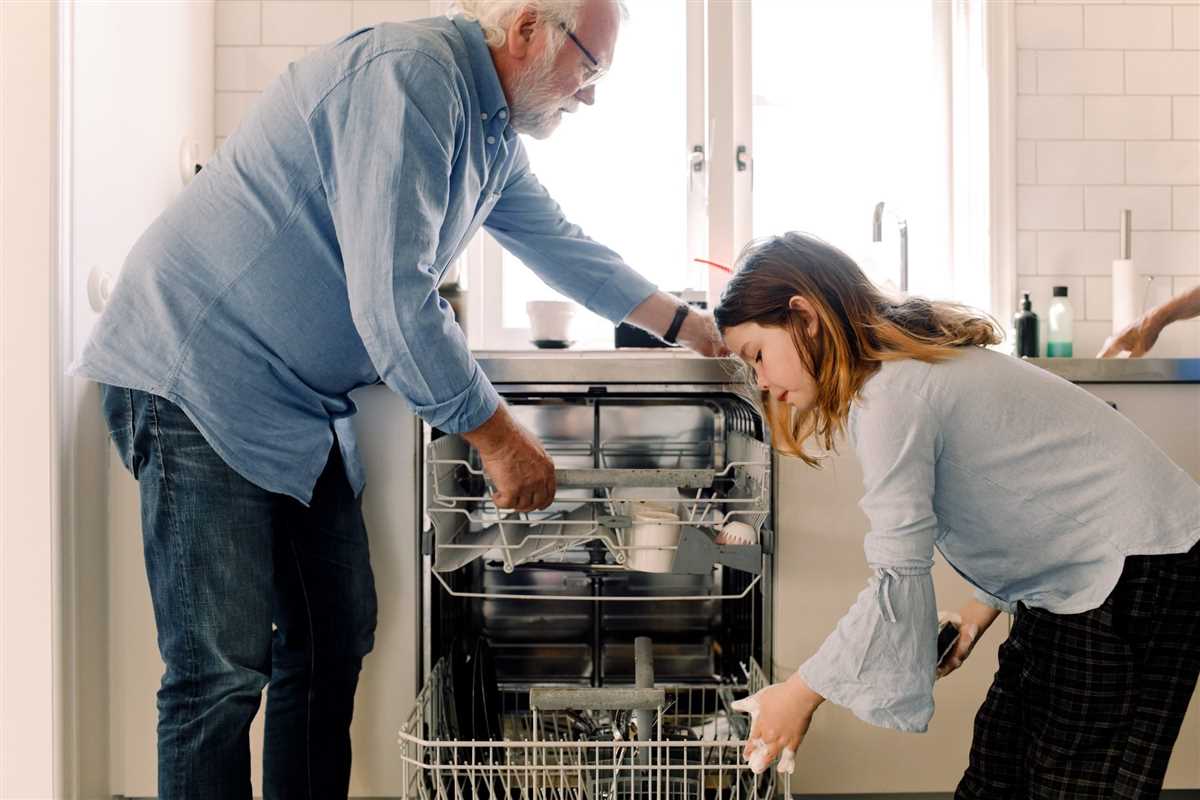
- Properly maintain your dishwasher by cleaning the filter regularly and ensuring it is free from debris.
- Avoid overcrowding the dishwasher as it can hinder the water flow and affect the cleaning performance.
- Scrape off excess food particles before loading your dishes to prevent clogs and potential damage to the dishwasher.
- Use the appropriate dishwasher detergent and avoid using odd substances that can harm the appliance.
- Check the hoses for any signs of wear or damage and replace them if necessary.
- Ensure proper ventilation by keeping the space around the dishwasher clear and allowing air circulation.
By following these simple maintenance tips, you can help keep your dishwasher in good shape and increase its longevity. Remember, a little care and attention can go a long way in saving you from costly repairs or premature replacement.
Tips for Extending the Lifespan of Your Dishwasher
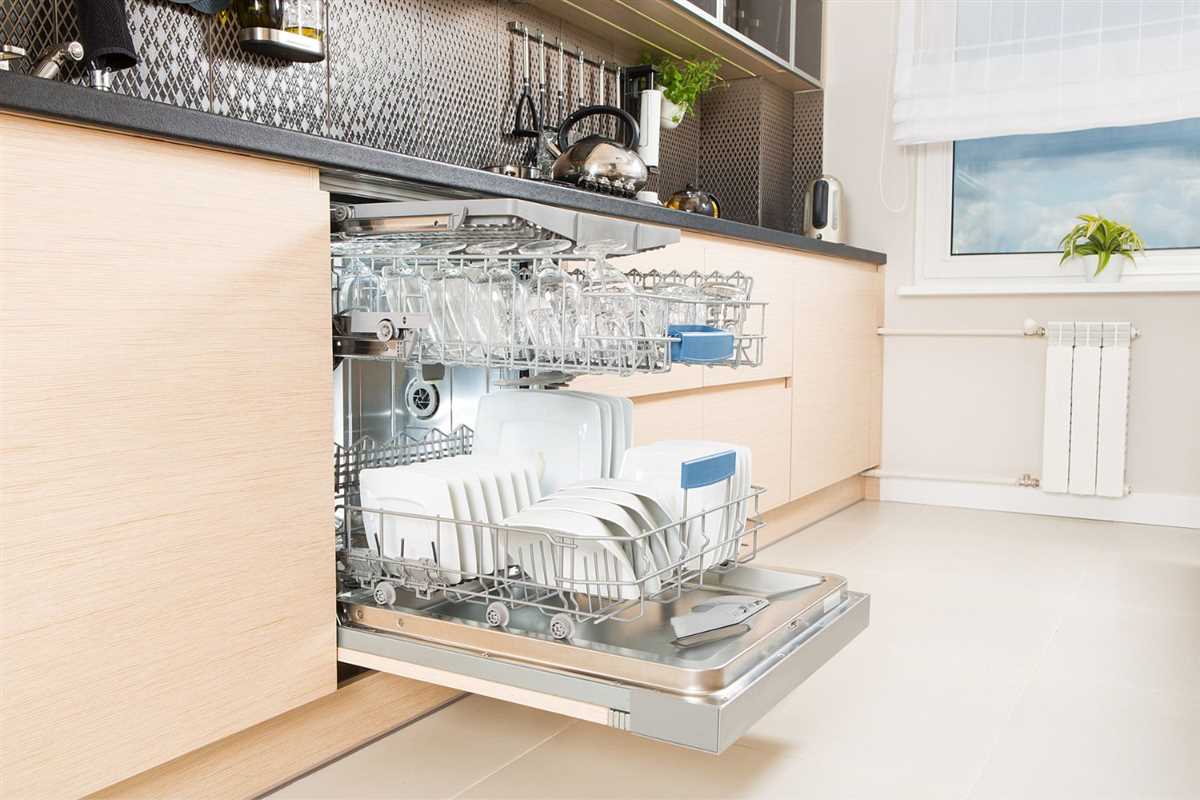
While dishwashers are a handy appliance that can make your life easier, they can also be expensive to replace. So, it’s important to take care of your dishwasher and extend its lifespan as much as possible. Here are 10 tips to help you do just that:
- Clean the dishwasher regularly: Just like any other machine, your dishwasher needs regular cleaning to stay in good shape. Follow the manufacturer’s instructions for cleaning, and make sure to remove any food scraps or debris that may clog the drain.
- Use hot water: Hot water is more effective at dissolving grease and cleaning dishes. So, make sure to set your dishwasher to the hottest water setting recommended for your dishes.
- Don’t overload the dishwasher: Overloading the dishwasher can strain its parts and reduce its lifespan. Be mindful of how much you’re putting in and make sure there’s enough room for water and detergent to circulate.
- Avoid hard water issues: Hard water can cause mineral buildup in your dishwasher, affecting its performance. If you have hard water, consider installing a water softener or using a dishwasher cleaner specifically designed for hard water.
- Check the dishwasher warranty: Most dishwashers come with a warranty, which can vary in coverage. Make sure to read the warranty carefully and understand what is covered. If your dishwasher is still under warranty and needs repairs, contact the manufacturer or an authorized technician.
- Replace worn-out parts: If your dishwasher is making strange noises or not cleaning as well as it used to, it may be a sign that certain parts need to be replaced. Don’t wait until the machine breaks down completely – call a technician to assess the issue.
- Be mindful of what you’re washing: Some dishes and utensils may not be dishwasher safe, so it’s important to read the manufacturer’s instructions. Placing non-dishwasher safe items in the dishwasher can damage both your dishes and the dishwasher itself.
- Follow the recommended loading guidelines: Your dishwasher’s manual should provide guidelines on how to load the dishes properly for optimal cleaning. It’s important to follow these guidelines to ensure your dishwasher works efficiently and lasts longer.
- Stay up-to-date on maintenance: Regularly check the hoses and connections of your dishwasher for any signs of leaks, cracks, or damage. If any issues are found, they should be repaired or replaced promptly.
- Consider replacing an old dishwasher: If your dishwasher is more than 8 or 9 years old and requires frequent repairs, it may be more cost-effective to replace it. Newer models are typically more energy-efficient and may come with advanced features that can save you time and water.
By following these tips, you can extend the lifespan of your dishwasher and avoid unnecessary expenses related to repairs or replacement. Remember, how long a dishwasher lasts depends on how well you take care of it, so make sure to give it the attention it needs!
Simple Maintenance Steps to Prolong the Life of Your Dishwasher
If you have recently bought a dishwasher or you have been using one for a while, you might be wondering how long it will last. While the average lifespan of dishwashers typically falls between 10 to 13 years, there are certain maintenance practices you can follow to extend its longevity and avoid costly repairs or replacements.
Regular Cleaning
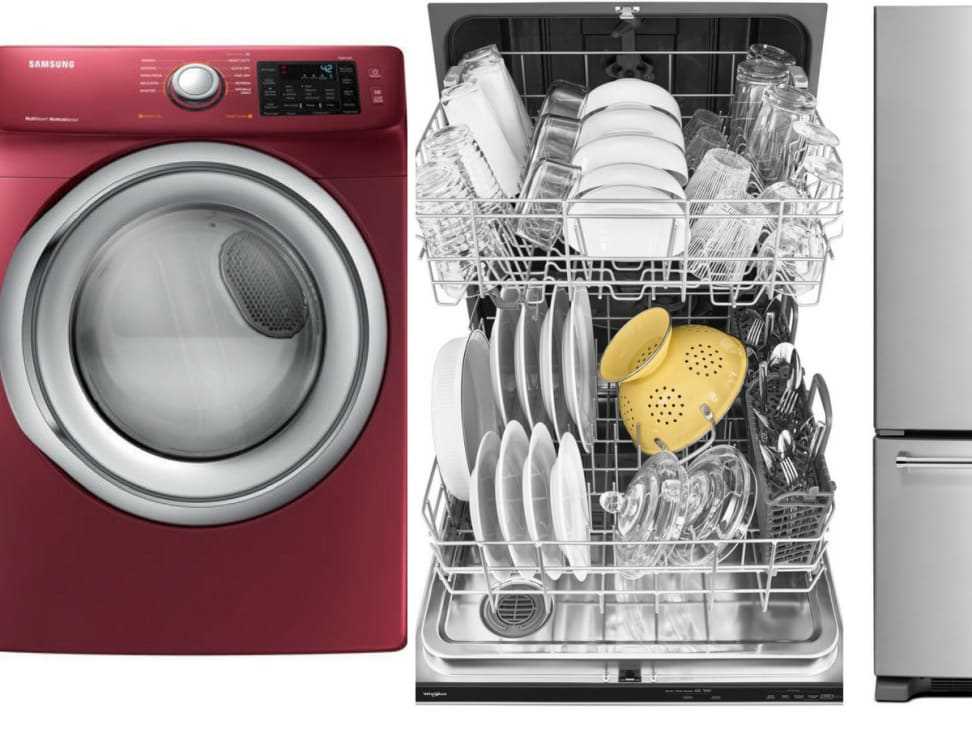
One of the most important things you can do to keep your dishwasher running smoothly is to clean it regularly. This includes not only washing the dishes but also cleaning the filter, spray arm, and door gasket. By removing any food debris or buildup that can clog the dishwasher’s components, you can avoid issues such as poor cleaning performance and unpleasant odors.
Checking for Issues
It’s a good practice to regularly check your dishwasher for any potential issues. Look for leaks, loose connections, or signs of wear and tear. If you notice any problems, it is best to address them as soon as possible to prevent them from worsening and causing further damage to your appliance.
Proper Loading
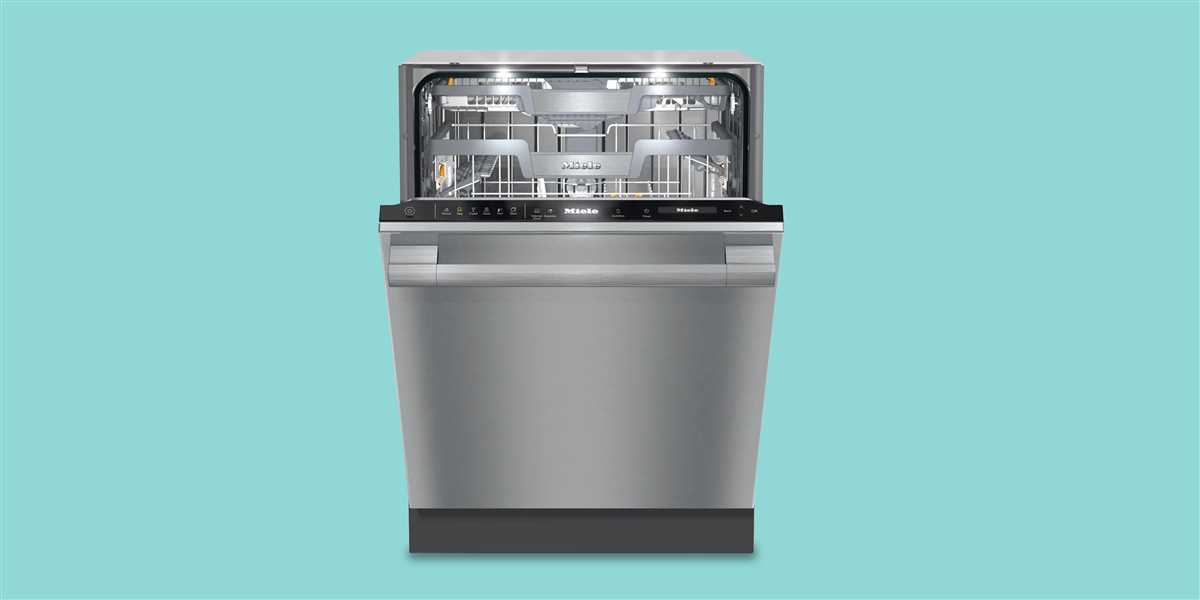
It’s important to load your dishwasher properly to avoid overloading and damaging the racks or spray arms. Make sure there is enough space between the dishes for proper water circulation and avoid blocking the detergent dispenser. Additionally, do not use the dishwasher to clean items that are not dishwasher-safe, such as wooden cutting boards or nonstick pans.
Regular Maintenance Tasks
In addition to regular cleaning, there are some handy maintenance tasks you can perform to keep your dishwasher in good condition. This includes checking the dishwasher’s door seal for any cracks or damage, cleaning the dishwasher’s ventilation system, and testing the water temperature to ensure it is within the manufacturer’s recommended range.
Follow the Manufacturer’s Guidelines
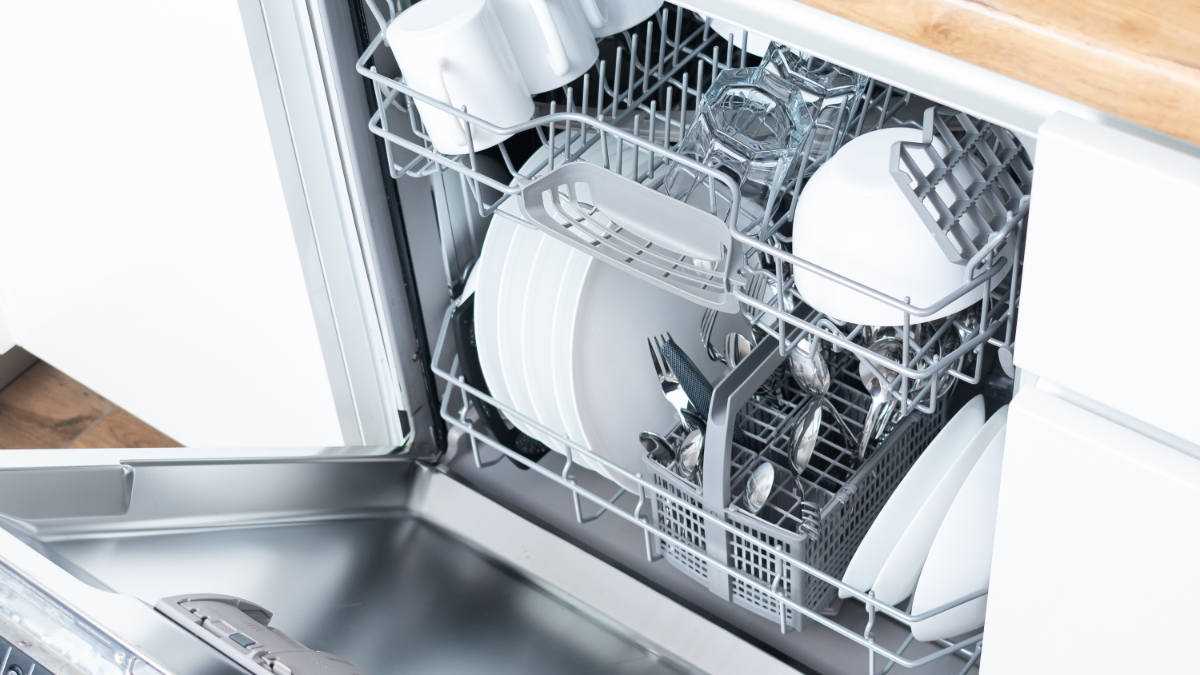
Every dishwasher is different, so it’s important to read and follow the manufacturer’s guidelines for your specific model. This includes information on how often to clean the dishwasher, what cleaning products to use, and any specific maintenance tasks that should be performed. By following these guidelines, you can ensure that your dishwasher operates efficiently and lasts longer.
Avoiding Common Mistakes
There are also some common mistakes to avoid that can negatively impact your dishwasher’s lifespan. Avoid overusing detergent, as excessive amounts can lead to residue buildup and affect the dishwasher’s performance. Similarly, avoid using the dishwasher as a storage space for dirty dishes or leaving them inside for too long, as this can lead to unpleasant odors and potential mold growth.
Seek Professional Help
If you encounter any significant issues with your dishwasher that you cannot fix yourself, it’s always best to seek professional help. Trying to fix complex issues without proper knowledge or experience can lead to further damage or even void the warranty of your dishwasher. A professional technician can diagnose and fix the problem efficiently, saving you time and potential expenses.
Conclusion
By following these simple maintenance steps, you can greatly extend the lifespan of your dishwasher. Regular cleaning, checking for issues, proper loading, and following the manufacturer’s guidelines are all essential practices to keep your dishwasher running smoothly. Avoid common mistakes and seek professional help when needed, and your dishwasher will continue to serve you well for years to come.
Common Signs Your Dishwasher May Need Repair
Is your dishwasher not functioning as it should? Are you having trouble getting your dishes clean or noticing strange noises during the wash cycle? These are typical signs that your dishwasher may need repair. It’s important to pay attention to these signs and address them promptly to avoid further damage to your appliance.
1. Poor Cleaning Performance
If your dishes are not coming out clean at the end of a wash cycle, it’s a clear sign that something is wrong. Look for signs of food residue or buildup on your dishes. This could indicate a problem with the spray arm, the dishwasher filter, or the water inlet valve.
2. Strange Noises
If you notice unusual noises coming from your dishwasher, such as grinding or humming sounds, it’s a sign that something is not functioning as it should. This could be caused by a faulty motor, worn-out bearings, or a broken pump. Addressing these issues promptly can prevent further damage and avoid the need for a more expensive repair or replacement.
3. Leaking Water
Water pooling around your dishwasher or visible leaks underneath are signs of a problem that should not be ignored. Leaks can occur due to damaged door gaskets, loose hoses, or a faulty water inlet valve. If left unaddressed, water damage can occur to your kitchen floor, cabinets, or countertops.
4. Foul Odors
If your dishwasher has a persistent foul odor, even after regular cleaning, it may be a sign of mold or mildew growth. This can happen if there is a lack of ventilation or if the dishwasher is not thoroughly drying between cycles. Regular upkeep and using a dishwasher cleaner can help combat this issue.
5. Long Cycle Times
If your dishwasher is taking longer than usual to complete a cycle, it may indicate a problem with the heating element. A dishwasher that is not reaching the correct temperature won’t be able to effectively clean your dishes. This can be caused by a faulty heating element or a problem with the dishwasher’s control board.
6. Error Codes
Some dishwashers have digital displays that show error codes. If you see an error code on your dishwasher’s display, consult the user manual or contact a professional to diagnose and repair the issue. Ignoring error codes may lead to further damage or breakdown of your dishwasher.
7. Intermittent Functionality

If your dishwasher works sometimes but not consistently, it may have an electrical issue. Loose connections or a malfunctioning control panel can cause intermittent functionality. It’s important to address this issue promptly to avoid a complete breakdown of the appliance.
If you notice any of these signs or any other odd behavior from your dishwasher, it’s important to have it inspected and repaired by a professional. Regular maintenance and quick repairs can extend the lifespan of your dishwasher and save you from having to replace it prematurely. Taking care of your dishwasher is just as important as taking care of any other appliance in your home, and it can save you time, money, and the hassle of washing dishes by hand.
Recognize Warning Signals and Address Issues Promptly
When it comes to your dishwasher, it’s important to keep an eye out for any warning signals that may indicate a problem. Recognizing these signals and addressing them promptly can help prolong the lifespan of your dishwasher and save you from expensive repairs or the need to replace it sooner than expected.
1. Strange Noises
If your dishwasher is making unusual noises that you haven’t heard before, it’s a sign that something might be wrong. While some noise is expected during the operation of a dishwasher, loud grinding or banging sounds can indicate an issue with the motor or other internal components. If you notice these noises, it’s important to have a professional technician take a look at your dishwasher to diagnose and fix the problem.
2. Leaking
Another warning signal to watch out for is water leaking from your dishwasher. A small amount of water around the dishwasher could be due to spills during loading or unloading, but if you consistently notice water on the floor or dripping from the dishwasher door, there may be a problem with the hoses, seals, or other parts of the appliance. Leaks should be addressed quickly to prevent water damage to your kitchen floor and cabinets.
3. Failure to Clean Properly
If your dishes are not coming out clean after a cycle, it could indicate an issue with your dishwasher. This could be due to clogged spray arms, blocked filters, or even mineral buildup. Regularly cleaning and maintaining these parts can help ensure that your dishwasher continues to work effectively. Following the manufacturer’s instructions for cleaning and maintenance is essential.
4. Long Cycle Times
If you find that your dishwasher is taking significantly longer to complete a cycle than usual, it may be a sign that something is not working properly. Long cycle times can be caused by issues with the heating elements, water temperature, or even the detergent used. It’s important to address this issue promptly, as prolonged cycle times not only waste energy but may also lead to further damage to the dishwasher.
5. Visual Signs of Wear and Tear
Lastly, visually inspecting your dishwasher for signs of wear and tear can help you identify potential issues early on. Look for rust or corrosion on the interior or exterior of the dishwasher, as well as loose or damaged parts. If you notice any of these signs, it’s important to have them addressed to prevent further damage.
Remember, regular maintenance and inspections can go a long way in extending the lifespan of your dishwasher. Along with these warning signals, following the manufacturer’s instructions and using the appliance correctly is essential. By taking good care of your dishwasher, you can keep it working efficiently for many years to come.
Proper Instructions for Using Your Dishwasher
Using a dishwasher can be a real time-saver when it comes to cleaning your dishes. However, in order to keep your dishwasher in good shape and extend its longevity, it is important to follow proper instructions. Here are some guidelines to help you make the most out of your dishwasher:
1. Read the Manual
Before you start using your dishwasher, take the time to read the manual provided by the manufacturer. This will give you a clear understanding of how to operate your specific dishwasher model.
2. Load the Dishes Properly
When loading your dishwasher, make sure to arrange the dishes in a way that allows proper water circulation. Avoid overcrowding the dishwasher and blocking the spray arm or the vents.
3. Pre-Rinse If Necessary
Although most modern dishwashers are capable of handling food particles, it is still a good practice to scrape off excess food from your dishes before loading them. This will help prevent clogging and ensure better cleaning results.
4. Use the Right Detergent
Make sure to use a dishwasher detergent specifically designed for use in dishwashers. Avoid using regular dish soap as it can cause excess suds and may damage your dishwasher.
5. Pay Attention to Water Temperature
Using hot water in your dishwasher can help remove tough food stains and kill bacteria. However, avoid using water that is too hot as it may damage delicate dishes or plastic items.
6. Maintain Proper Ventilation
Proper ventilation is crucial for the optimal performance of your dishwasher. Make sure that the area around the dishwasher is clear to allow air circulation and prevent overheating.
7. Regular Maintenance and Repair
Like any other household appliance, dishwashers require regular maintenance and occasional repair. If you notice any signs of malfunction, such as odd noises or poor cleaning performance, consider calling a technician to fix the issue.
8. Keep the Dishwasher Clean
Periodically clean your dishwasher to prevent the buildup of mineral deposits and food particles. You can use a dishwasher cleaner or run an empty cycle with a cup of white vinegar to keep your dishwasher fresh and odor-free.
9. Follow Manufacturer’s Warranty
If your dishwasher is still under warranty, make sure to follow the manufacturer’s instructions regarding maintenance and repairs. This will help you avoid paying for costly repairs that could otherwise be covered by the warranty.
By following these proper instructions for using your dishwasher, you will be able to keep it in good shape and ensure its longevity. Remember to read the manual, load the dishes properly, use the right detergent and water temperature, maintain proper ventilation, and clean your dishwasher regularly. These practices will help you make the most out of your dishwasher and save you time and effort in the long run.
FAQ
What is the average lifespan of a dishwasher?
The average lifespan of a dishwasher is around 9-12 years.
Can a dishwasher last longer than 12 years?
Yes, it is possible for a dishwasher to last longer than 12 years if it is properly maintained and repaired when necessary.
What factors can affect the lifespan of a dishwasher?
Several factors can affect the lifespan of a dishwasher, including the brand and model, how often it is used, the quality of the water, and how well it is maintained.
Is it worth repairing a dishwasher that is nearing the end of its lifespan?
It depends on the cost of the repair and the overall condition of the dishwasher. In some cases, it may be more cost-effective to replace the dishwasher instead of repairing it.
What are some signs that a dishwasher may need to be replaced?
Some signs that a dishwasher may need to be replaced include frequent breakdowns, poor cleaning performance, leaks, loud noises, and outdated technology.
How often should the hoses in a dishwasher be replaced?
The hoses in a dishwasher should be replaced every 5-7 years. Regularly replacing the hoses helps prevent leaks and ensures the dishwasher’s proper functioning.
Can replacing the hoses extend the lifespan of a dishwasher?
Yes, replacing the hoses regularly can help extend the lifespan of a dishwasher by preventing leaks and reducing the risk of water damage.











